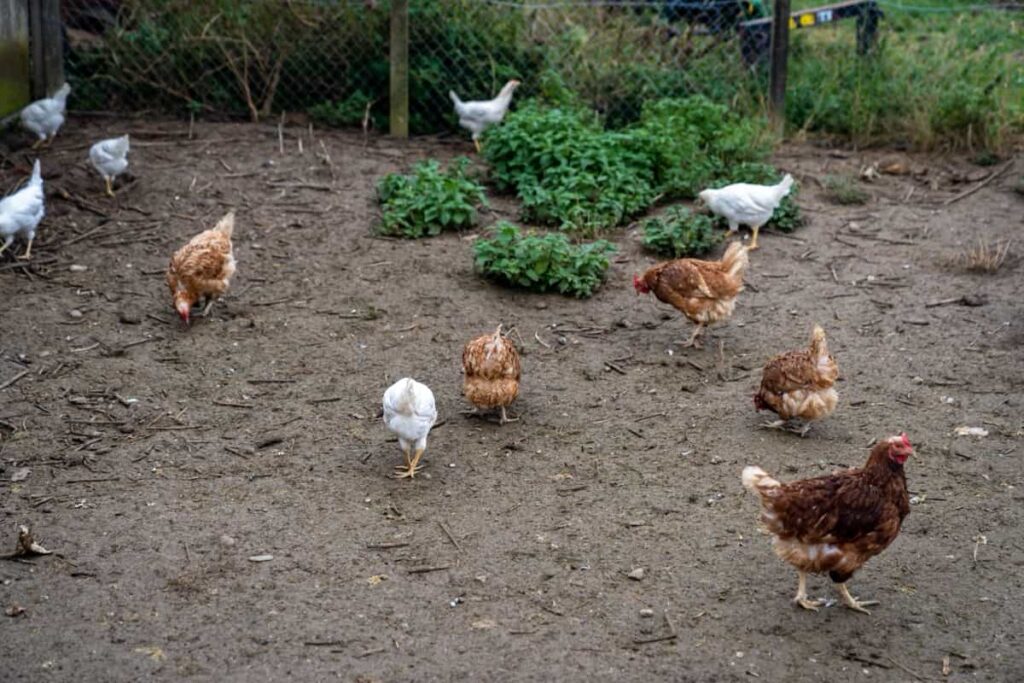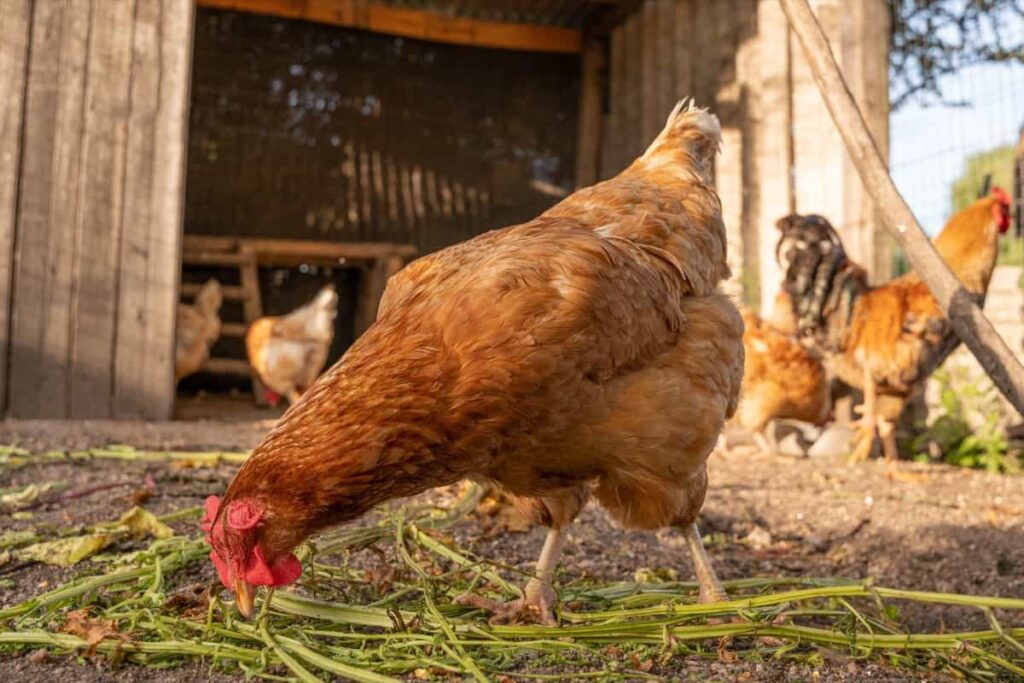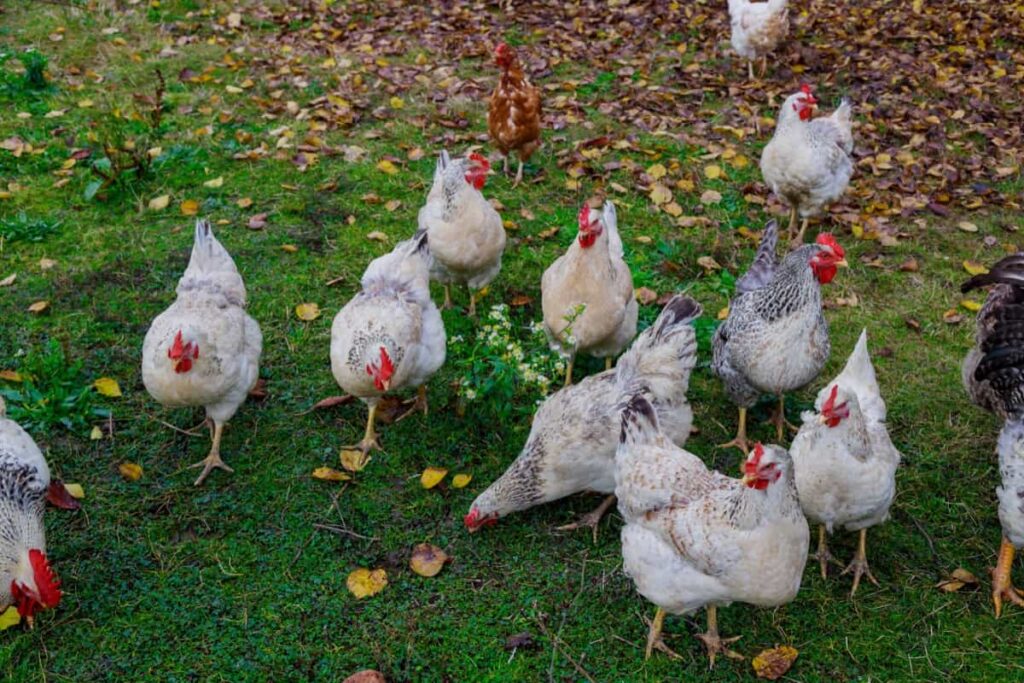Backyard chicken manure management is the process of effectively handling and utilizing chicken waste in a backyard setting. It involves collecting, storing, composting, and using chicken manure to benefit gardens and farms. Proper management helps maintain a clean coop environment while harnessing the nutrient-rich properties of chicken manure for agricultural purposes.

Overview of Backyard Chicken Manure Management
The Importance of Proper Manure Management
The importance of backyard chicken manure management extends beyond just hygiene – it has a direct impact on soil health and plant growth. Chicken manure is rich in essential nutrients like nitrogen, phosphorus, and potassium that promote robust plant development. In addition to its nutrient-rich properties, utilizing chicken manure as a fertilizer helps reduce waste going to landfills or polluting water sources.
Benefits of Chicken Manure in Gardening and Farming
It offers a multitude of benefits for both your garden and the environment. Chicken manure is rich in essential nutrients like N, P, and K (nitrogen, phosphorus, and potassium), making it a valuable organic fertilizer for plants. Chicken manure is rich in essential nutrients like nitrogen, phosphorus, and potassium, which can significantly improve soil fertility. Moreover, utilizing chicken manure as a natural fertilizer helps reduce waste accumulation in landfills and minimizes the environmental impact of chemical runoff from conventional fertilizers.
Understanding Chicken Manure Composition
Nutrient Content and Benefits of Chicken Manure
Chicken manure is a major resource for gardeners due to its rich nutrient content. It contains essential elements like nitrogen, phosphorus, and potassium that are beneficial for plant growth. When properly composted, chicken manure can enhance soil fertility and improve crop yields.
Handling and Safety Precautions for Manure
It’s important to handle chicken manure with care as it may contain harmful pathogens like E. coli or Salmonella. To ensure safety, always wear gloves and wash your hands thoroughly after handling manure. Avoid using fresh chicken manure on edible crops that will be consumed raw to prevent potential health risks. Properly managing chicken manure not only benefits your plants but also reduces environmental pollution by preventing nutrient runoff into water sources.
Collection and Storage Techniques
Efficient Methods for Collecting Chicken Manure
The most effective method for collecting chicken manure is to do it regularly. This helps prevent a build-up of waste, which can lead to odor issues and attract pests. Having designated collection containers or bins near the coop makes it easier to gather the manure daily. Consider using a shovel or rake for quick and efficient removal.
In case you missed it: The Ultimate Guide to Fermenting Chicken Feed: Boost Health and Savings

Best Practices for Storing Manure to Prevent Odor and Pests
As for storing chicken manure, ensuring proper ventilation is crucial to prevent odors from becoming overwhelming. Use a covered container or compost bin that allows airflow while keeping pests out. By implementing these best practices for collecting and storing chicken manure, you can maintain a clean coop environment while minimizing unpleasant odors and deterring unwanted visitors.
Composting Chicken Manure
Steps for Composting Chicken Manure at Home
Composting chicken manure at home is a sustainable method to manage waste and create nutrient-rich soil for your garden. To start, gather the manure along with carbon-rich materials like straw or leaves. Make sure to keep the pile moist but not soggy, as proper moisture levels are essential for decomposition. Turn the compost regularly to aerate it and speed up the process of breaking down the organic matter.
As the compost matures, it will begin to heat up as beneficial microbes work their magic. This heat helps kill off pathogens and weed seeds, resulting in a safe and potent fertilizer for your plants. Once fully decomposed, you can spread this black gold on your garden beds or mix it into potting soil for added fertility.
Tips for Speeding Up the Composting Process
First, make sure the compost pile has a good balance of green (nitrogen-rich) and brown (carbon-rich) materials. This balance will promote quicker decomposition. Chop or shred larger materials before adding them to the pile. Smaller pieces break down faster, speeding up the overall process. Keep your compost moist but not soggy. Moisture is essential for decomposition, but too much water can slow things down. Consider adding a compost activator to introduce more beneficial bacteria and fungi into the mix, accelerating decomposition even further.
Direct Application in Gardens
Guidelines for Direct Use of Chicken Manure in Gardens
When it comes to using chicken manure in your garden, direct application can be beneficial for plant growth. However, it’s essential to follow some guidelines to prevent any potential harm to your plants. Before applying the chicken manure directly onto your garden beds, make sure it’s well-aged and composted. Fresh manure can burn plant roots due to its high nitrogen content.
Precautions to Avoid Plant Damage
Spread a thin layer of composted chicken manure over the soil surface and avoid placing it directly in contact with plant stems or leaves. This helps prevent burning and allows for gradual nutrient release into the soil. Monitor your plants closely after applying chicken manure, and watch out for any signs of stress or nutrient imbalances. Adjust the amount used, if necessary, based on how your plants respond.
In case you missed it: Kadaknath Chicken Farming in India: Exploring Profitable Black Chicken Farming Business Plan

Manure Tea: Liquid Fertilizer Option
How to Make and Use Manure Tea for Plant Feeding
If you’re looking for a natural way to boost your plants’ growth, manure tea could be the answer. This liquid fertilizer is easy to make and offers benefits for both soil health and plant vitality. To create manure tea, soak chicken manure in water for a few days until it forms a nutrient-rich solution. Dilute this mixture with water before applying it to your garden or potted plants.
Benefits of Manure Tea for Soil and Plant Health
Manure tea provides essential nutrients like nitrogen, phosphorus, and potassium that help plants thrive. It also improves soil structure and promotes beneficial microorganisms that enhance overall plant health. By incorporating manure tea into your gardening routine, you can nourish your plants organically while reducing the need for synthetic fertilizers. Give it a try and watch your garden flourish.
Integrating Manure Management into Chicken Coop Design
Design Features that Facilitate Easy Manure Collection
Adding removable trays under roosting areas for quick waste removal. Consider sloping floors towards a collection point for easy cleanup. Installing a slanted floor for easy drainage or using removable trays under roosting areas for quick and efficient manure removal. By integrating smart design elements into your chicken coop layout, you can streamline manure management and create a healthier environment for both your chickens and yourself.
Innovative Coop Designs for Improved Manure Management
Innovative designs like automatic manure removal systems are gaining popularity for their efficiency. Some coops even have built-in composting sections within the structure itself. Ventilation and airflow play a major role in reducing ammonia build-up from manure, so ensure your coop has adequate ventilation to maintain air quality. Additionally, natural lighting can help dry out damp areas where manure accumulates, preventing odors and pests.
Environmental Considerations
Mitigating the Environmental Impact of Manure Disposal
When it comes to managing chicken manure in your backyard, it’s essential to consider the environmental impact. Improper disposal of manure can affect water pollution and nutrient runoff, which can harm ecosystems nearby. To mitigate these risks, it’s crucial to follow regulations and best practices for manure management. One way to minimize environmental impact is by composting chicken manure before using it as fertilizer. This process helps break down harmful pathogens and reduces the nutrient-leaching risk into the soil.
Regulations and Best Practices for Manure Management
Regulations may vary depending on your location, so be sure to familiarize yourself with local guidelines for manure disposal. By following these regulations and implementing best practices such as proper storage and composting techniques, you can help protect the environment while also reaping the benefits of nutrient-rich chicken manure for your garden or farm.
Health and Safety Concerns
Preventing Disease Transmission Through Proper Manure Handling
When it comes to managing backyard chicken manure, health and safety should be top priorities. Proper handling techniques can help prevent the transmission of diseases. Always wear protective gloves and masks when dealing with chicken manure to protect yourself from potential pathogens.
Personal Protective Equipment and Hygiene Practice
Maintaining good hygiene practices is essential to reduce the risk of contamination. Wash your hands thoroughly after handling chicken manure to avoid spreading any harmful bacteria. Additionally, ensure that you clean and disinfect any tools or equipment used in the process to prevent cross-contamination. By taking these precautions seriously, you can create a safe environment for both yourself and your chickens.
In case you missed it: Wyandotte Chicken Varieties: Exploring Wyandotte Types with Colors

Conclusion
Backyard chicken manure management is crucial for maintaining a healthy and sustainable environment in your backyard. Properly managing chicken manure can significantly reduce odor, prevent pests, and improve the overall cleanliness of your coop. By effectively handling poultry waste, you can also create valuable resources for gardening and farming purposes.
- Management Pests and Diseases in Your Cotton Field
- Sheep Farming Business Plan for Beginners
- Aquaponic Farming at Home: A Step-By-Step Guide
- Profitable Village Farming Business Ideas in 2024
- High-Yield Aquaculture: Fast-Growing Fish for Farming
- Effective Fish Pond Construction Techniques for Beginners
- Irrigation and Water Management in Pineapple Farming
- Blossom to Harvest: Mastering Flowering and Pollination in Papaya Farming
- Pig Fattening Essentials: From Selection to Sale for Beginners
